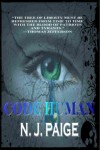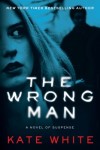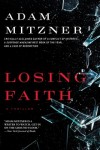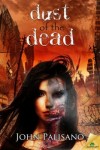

June 1 – 7: “How do you choose your character’s names?”
 This week ITW Members Jeffrey Westhoff, N. J. Paige, Kate White, John Farrow, Eric Red, Adam Mitzner, Scott A. Lerner, Mark Pryor, Lisa Von Biela, John Palisano and Paul Gistsham kick off June by discussing how they choose their character’s names.
This week ITW Members Jeffrey Westhoff, N. J. Paige, Kate White, John Farrow, Eric Red, Adam Mitzner, Scott A. Lerner, Mark Pryor, Lisa Von Biela, John Palisano and Paul Gistsham kick off June by discussing how they choose their character’s names.
~~~~~
 Author and attorney Scott A. Lerner resides in Champaign, Illinois. He obtained his undergraduate degree in psychology from the University of Wisconsin in Madison and went on to obtain his Juris Doctor degree from the University of Illinois in Urbana Champaign. Lerner’s first novel and the first Samuel Roberts Thriller, Cocaine Zombies, won a bronze medal in the mystery/cozy/noir category of the 2013 Independent Publisher (IPPY) Awards. The second book in the series is Ruler of Demons. The Fraternity of the Soul Eater is book 3. Book 4, The Wiccan Witch of the Midwest, will be released on Halloween, 2015. Mr. Lerner lives with his wife, their two children, and their cat Fern. Lerner collects unusual antiques and enjoys gardening, traveling, reading fiction, and going to the movies.
Author and attorney Scott A. Lerner resides in Champaign, Illinois. He obtained his undergraduate degree in psychology from the University of Wisconsin in Madison and went on to obtain his Juris Doctor degree from the University of Illinois in Urbana Champaign. Lerner’s first novel and the first Samuel Roberts Thriller, Cocaine Zombies, won a bronze medal in the mystery/cozy/noir category of the 2013 Independent Publisher (IPPY) Awards. The second book in the series is Ruler of Demons. The Fraternity of the Soul Eater is book 3. Book 4, The Wiccan Witch of the Midwest, will be released on Halloween, 2015. Mr. Lerner lives with his wife, their two children, and their cat Fern. Lerner collects unusual antiques and enjoys gardening, traveling, reading fiction, and going to the movies.
 Jeffrey Westhoff grew up in Erie, Pa., and went to college at Marquette University in Milwaukee. He has worked a journalist and film critic. The Boy Who Knew Too Much, from Intrigue Publishing, is his first novel. He lives in Chicago’s northwest suburbs with his wife, Jeanette.
Jeffrey Westhoff grew up in Erie, Pa., and went to college at Marquette University in Milwaukee. He has worked a journalist and film critic. The Boy Who Knew Too Much, from Intrigue Publishing, is his first novel. He lives in Chicago’s northwest suburbs with his wife, Jeanette.
 N. J. Paige lives in Pennsylvania with her husband and two children. Her favorite motto is “Life is a journey best taken one step at a time.” And one of her favorite pass-time activity is to hike through her local forest, where she gets inspiration from Tree-sprites.
N. J. Paige lives in Pennsylvania with her husband and two children. Her favorite motto is “Life is a journey best taken one step at a time.” And one of her favorite pass-time activity is to hike through her local forest, where she gets inspiration from Tree-sprites.
 Kate White, the former editor-in-chief of Cosmopolitan magazine, is the New York Times bestselling author of six Bailey Weggins mysteries and four stand-alone suspense novels, including Eyes on You, and the upcoming The Wrong Man (June 16). She is also the editor of The Mystery Writers of America Cookbook.
Kate White, the former editor-in-chief of Cosmopolitan magazine, is the New York Times bestselling author of six Bailey Weggins mysteries and four stand-alone suspense novels, including Eyes on You, and the upcoming The Wrong Man (June 16). She is also the editor of The Mystery Writers of America Cookbook.
 John Farrow is the “crime” pseudonym for Canadian novelist Trevor Ferguson. His series with Sergeant-Detective Émile Cinq-Mars was called the best of our time by Booklist, and the best of all time by Die Zeit in Germany. The first novels were published in seventeen countries. The Storm Murders is the first of a new trilogy of Cinq-Mars thrillers, published by Minotaur, and has received starred reviews in Kirkus, PW and Library Journal.
John Farrow is the “crime” pseudonym for Canadian novelist Trevor Ferguson. His series with Sergeant-Detective Émile Cinq-Mars was called the best of our time by Booklist, and the best of all time by Die Zeit in Germany. The first novels were published in seventeen countries. The Storm Murders is the first of a new trilogy of Cinq-Mars thrillers, published by Minotaur, and has received starred reviews in Kirkus, PW and Library Journal.
 Paul Gitsham has enjoyed careers as varied as a research biologist, receptionist, tracker of terrorists for a major UK bank and finally secondary school science teacher. He now writes the DCI Warren Jones series of modern British police procedurals. The first two books, The Last Straw and No Smoke Without Fire, were Amazon best-sellers. The third in the series, Silent as the Grave, was released in 2015, alongside an exclusive short story Blood is Thicker Than Water. He lives in a flat in the East of England with more books than shelf space.
Paul Gitsham has enjoyed careers as varied as a research biologist, receptionist, tracker of terrorists for a major UK bank and finally secondary school science teacher. He now writes the DCI Warren Jones series of modern British police procedurals. The first two books, The Last Straw and No Smoke Without Fire, were Amazon best-sellers. The third in the series, Silent as the Grave, was released in 2015, alongside an exclusive short story Blood is Thicker Than Water. He lives in a flat in the East of England with more books than shelf space.
 Eric Red is a Los Angeles based novelist, screenwriter and film director. His first novel, Don’t Stand So Close, is available in hardcover and trade paperback from SST Publications. His second and third novels, the werewolf western The Guns Of Santa Sangre and the sci-fi monster novel It Waits Below, are available from Samhain Publishing. Recent published short stories have been in Weird Tales Magazine, Cemetery Dance Magazine, Shroud Magazine, and the Dark Delicacies III: Haunted anthology. He created and wrote the comic series and graphic novel Containment for IDW Publishing and the comic series Wild Work for Antarctic Press. His films include The Hitcher, Near Dark, Cohen and Tate, Body Parts, Bad Moon and 100 Feet.
Eric Red is a Los Angeles based novelist, screenwriter and film director. His first novel, Don’t Stand So Close, is available in hardcover and trade paperback from SST Publications. His second and third novels, the werewolf western The Guns Of Santa Sangre and the sci-fi monster novel It Waits Below, are available from Samhain Publishing. Recent published short stories have been in Weird Tales Magazine, Cemetery Dance Magazine, Shroud Magazine, and the Dark Delicacies III: Haunted anthology. He created and wrote the comic series and graphic novel Containment for IDW Publishing and the comic series Wild Work for Antarctic Press. His films include The Hitcher, Near Dark, Cohen and Tate, Body Parts, Bad Moon and 100 Feet.
 In addition to being the author of three critically acclaimed legal thrillers (including a Suspense Magazine book of the year), Adam Mitzner is also the head of the litigation department of Pavia & Harcourt LLP, a Manhattan law firm. He lives in New York City with his wife and children. Adam graduated from Brandeis University with a B.A. and M.A. in politics, and from the University of Virginia School of Law. Most importantly, he is an avid Pez collector and a lover of all things Batman.
In addition to being the author of three critically acclaimed legal thrillers (including a Suspense Magazine book of the year), Adam Mitzner is also the head of the litigation department of Pavia & Harcourt LLP, a Manhattan law firm. He lives in New York City with his wife and children. Adam graduated from Brandeis University with a B.A. and M.A. in politics, and from the University of Virginia School of Law. Most importantly, he is an avid Pez collector and a lover of all things Batman.
 Mark Pryor is the author of the Hugo Marston novels The Bookseller, The Crypt Thief, The Blood Promise, and The Button Man, and the true-crime book As She Lay Sleeping. A native of Hertfordshire, England, he is an assistant district attorney in Austin, Texas, where he lives with his wife and three children.
Mark Pryor is the author of the Hugo Marston novels The Bookseller, The Crypt Thief, The Blood Promise, and The Button Man, and the true-crime book As She Lay Sleeping. A native of Hertfordshire, England, he is an assistant district attorney in Austin, Texas, where he lives with his wife and three children.
 John Palisano‘s non-fiction has appeared in FANGORIA and DARK DISCOVERIES magazines. His first novel from Samhain Publishing, DUST OF THE DEAD, will be released in June 2015. John Palisano’s short stories have appeared in anthologies from PS Publishing, Terror Tales, Lovecraft eZine, Horror Library, Bizarro Pulp, Written Backwards, Dark Continents, Darkscribe, DarkFuse, Dark House, and more. His stories have twice been Bram Stoker Award Nominees.
John Palisano‘s non-fiction has appeared in FANGORIA and DARK DISCOVERIES magazines. His first novel from Samhain Publishing, DUST OF THE DEAD, will be released in June 2015. John Palisano’s short stories have appeared in anthologies from PS Publishing, Terror Tales, Lovecraft eZine, Horror Library, Bizarro Pulp, Written Backwards, Dark Continents, Darkscribe, DarkFuse, Dark House, and more. His stories have twice been Bram Stoker Award Nominees.
 Lisa von Biela worked in Information Technology for 25 years, then dropped out to attend the University of Minnesota Law School, graduating magna cum laude in 2009. She now practices law in Seattle, Washington. Lisa began writing short, dark fiction just after the turn of the century. Her first publication appeared in The Edge in 2002. She went on to publish a number of short works in various small press venues, including Gothic.net, Twilight Times, Dark Animus, AfterburnSF, and more. She is the author of the novels THE GENESIS CODE, THE JANUS LEGACY, and BLOCKBUSTER, as well as the novella ASH AND BONE.
Lisa von Biela worked in Information Technology for 25 years, then dropped out to attend the University of Minnesota Law School, graduating magna cum laude in 2009. She now practices law in Seattle, Washington. Lisa began writing short, dark fiction just after the turn of the century. Her first publication appeared in The Edge in 2002. She went on to publish a number of short works in various small press venues, including Gothic.net, Twilight Times, Dark Animus, AfterburnSF, and more. She is the author of the novels THE GENESIS CODE, THE JANUS LEGACY, and BLOCKBUSTER, as well as the novella ASH AND BONE.
- LAST GIRL MISSING with K.L. Murphy - July 25, 2024
- CHILD OF DUST with Yigal Zur - July 25, 2024
- THE RAVENWOOD CONSPIRACY with Michael Siverling - July 19, 2024
